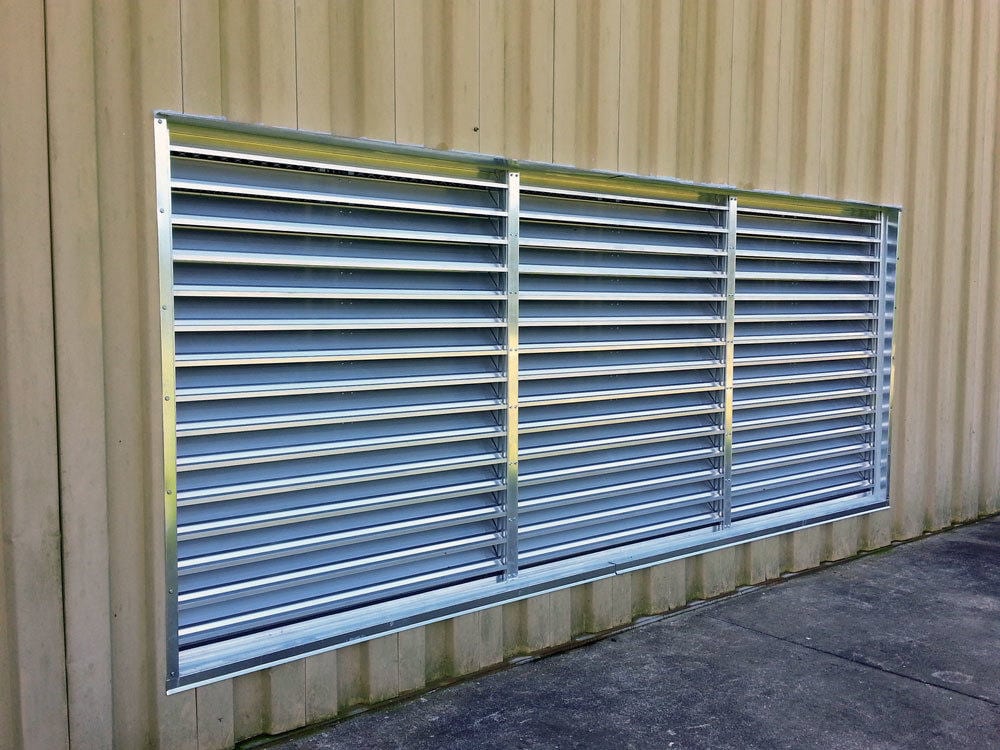What Are the Advantages of Industrial Wall Louvers?

For an industrial space, you need an industrial wall louver. Louvers, dampers, and valves designed for a commercial building just aren’t enough when it comes to industrial ventilation. Moffitt wall louvers are They are strong enough to stand up to the toughest industrial applications like steel mills and heavy manufacturing. Additionally, many of them can be adjusted to accommodate changing conditions. Read on to learn more about the advantages of industrial wall louvers.
How Do They Compare to Commercial Wall Louvers?
Commercial louvers, or dampers, are generally designed to allow some air to flow into or out of the building. Their priority is to prevent rain entry while still allowing some air flow. They are often made of light-weight metal or even plastic. Generally, these louvers prioritize architectural aesthetics over performance. They are great for smaller spaces like storerooms or restaurants, but totally insufficient for an industrial space.
Moffitt industrial louvers, however, are ideal for industrial environments. Each louver is unbending and non-corrosive construction stainless steel or aluminum. They also utilize heavy-duty gears, chains, and cranks to withstand breakages. Industrial louvers are generally larger as well. In fact, you can connect multiple units to form a single, larger louver bank. Multiple units, working as one, running down the entire length of a building. That’s something that’s simple not possible with an off-the-shelf commercial louver.
Which Material Will Work Best for Different Applications?
Steel mills, foundries, forges, and glass plants require industrial strength wall louvers. This unit is optimal for these environments because the durable construction ensures that they will stand up to the high heat and everyday wear and tear from heavy industry. Industrial louvers are available in several types of materials.
- Stainless Steel – Most durable option. It can hold up to extremely hot temperatures while maintaining its durability.
- Aluminum – The aluminum wall louver is lower in cost, weight and easier to maintain. Also, it doesn’t rust or corrode. Not as durable as stainless steel but still suitable for most environments.
- Galvanized Steel – Steel with a coat of zinc for corrosion resistance and extra durability. Stronger than aluminum but will eventually rust.
Wall Louver Blade Angles to Fit your Requirements
Different buildings have different blade angle requirements. A commercial building may only require minimal air movement and as a result, a 15˚ – 25˚ blade angle is sufficient. Hot, industrial plants however, require maximum air flow. As a result, blade angles the open 90˚ are often required. For buildings that need both enhanced air flow and weather protection, 30˚ or 40˚ fixed blades might be the best option. Moffitt can help you find the right blade angles for your building.
Moffitt Industrial Wall Louvers
The Moffitt research and development team is constantly innovating when it comes to our wall louvers. We’ve been designing air intake systems for over sixty years and have been learning every step of the way. For instance, several years ago we changed the game for 90˚ wall louvers. We developed the EcoStream 90˚ (ES90) wall louver to allow the louver blades to fully open without extending beyond the building frame. This allowed for easier navigation around the louvers without compromising air flow.
More recently we came up with the DataStream louver™ modular wall system to reduce installation time in the field and relocating labor to the manufacturing plant. This revolutionary design promises to drastically reduce dry-in time for new construction projects in need of industrial wall louvers.
Additionally, we’ve learned which wall louvers work best in which buildings. Our design team will help you find the right wall louver ventilation solution for your applications. Call us today at 1 (800) 474-3267 to start on your new ventilation solution.
